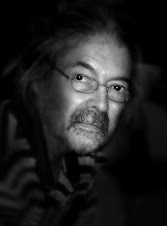Hosts: The Society of Urban Poetry & Stone Soup Presents
Who Are We Hosting: TBD
When: Monday, October 5th 7PM-10PM
What: International Beat Poetry Festival
Why? What's BEAT you say?
Beat poetry evolved during the 1940s in both New York City and on the west coast, although San Francisco became the heart of the movement in the early 1950s. The end of World War II left poets like Allen Ginsberg, Gary Snyder, Lawrence Ferlinghetti and Gregory Corso questioning mainstream politics and culture. These poets would become known as the Beat generation, a group of writers interested in changing consciousness and defying conventional writing. The Beats were also closely intertwined with poets of the San Francisco Renaissance movement, such as Kenneth Rexroth and Robert Duncan.
The battle against social conformity and literary tradition was central to the work of the Beats. Among this group of poets, hallucinogenic drugs were used to achieve higher consciousness, as was meditation and Eastern religion. Buddhism especially was important to many of the Beat poets; Snyder and Ginsberg both intensely studied this religion and it figured into much of their work.
Ginsberg's first book, Howl and Other Poems, is often considered representative of the Beat poets. In 1956 Ferlinghetti's press City Lights published Howl and Ferlinghetti was brought to trial the next year on charges of obscenity. In a hugely publicized case, the judge ruled that Howl was not obscene and brought national attention to Ginsberg and the Beat poets.
Besides publishing the Pocket Poets Series, Ferlinghetti also founded the legendary San Francisco bookstore City Lights. Still in operation today, City Lights is an important landmark of Beat generation history. Several of the surrounding streets have been renamed after Beat poets as well, commemorating their important contribution to the cultural landscape of San Francisco.
Other Beat poets included Diane di Prima, Neal Cassady, Anne Waldman, and Michael McClure. Although William S. Burroughs and Jack Kerouac are often best remembered for works of fiction such as Naked Lunch and On the Road, respectively, they also wrote poetry and were very much part of the Beats as well; Kerouac is said to have coined the term "Beat generation," describing the down-and-out status of himself and his peers during the post-war years.
FEATURES
Venus de Mars is a Minneapolis-based multidisciplinary artist and musician, best known as a singer-songwriting transgender rock star and leader of the band All the Pretty Horses. H/ir most recent album "Flesh and Wire" (acoustic) was produced by longtime collaborator Barb Morrison (Debbie Harry, Rufus Wainwright, Scissor Sisters, etc.). De Mars is the recipient of multiple grants and awards, among them a Minnesota State Arts Board grant, a Bush Fellowship, and a Minnesota Music Award.
Lynette Reini-Grandell's first collection of poetry, Approaching the Gate, won the 2015 Northeastern Minnesota Book Award for poetry. Her work has appeared in Poetry City USA, It’s Animal but Merciful, Poetry Motel, and Revolver, among others. Her work is part of a permanent art installation (with Venus de Mars) in room 5D of the Carlton Arms Hotel in Manhattan, and she has received grants from the Minnesota State Arts Board and the Finlandia Foundation. In Minneapolis, she performs regularly with the Bosso Poetry Company, a subsidiary of Bosso Enterprises, theoretically based in Big Lever, Wyoming.
Jonathan J. Joseph: human poet, vessel of truth, an artist who naturally discovered Out of The Blue, while walking past it on what seemed to be a random moment during an ordinary Monday last year, but fortunately as life would have it, this crossed path opened him into the cradle from which his experience on the open mic sprang up and grew with the energy that circulates through us all. Each words represents a morsel of love brought together to form the bold pieces which are given a place in existence to thrive through oral recitation and individual reading across the world.




